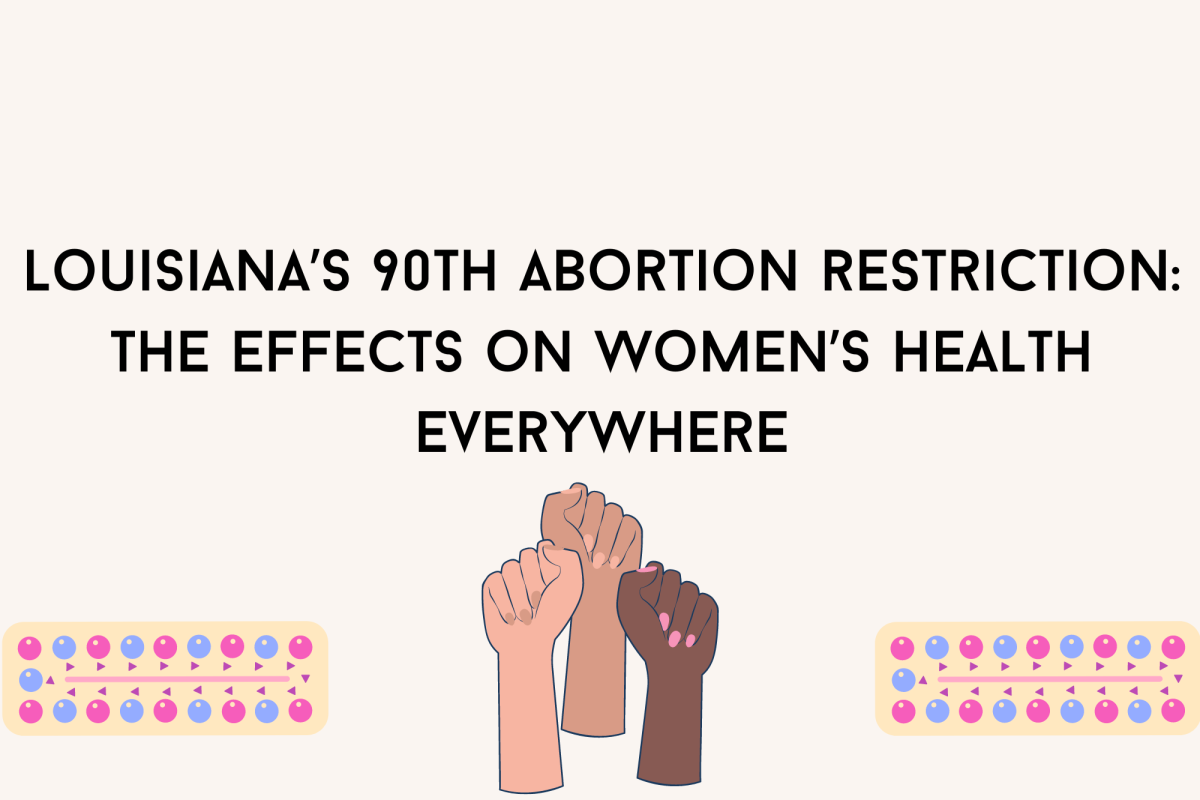The abortion medication mifepristone has been in use for over 20 years after being approved by the Food and Drug Administration in 2000, and it has repeatedly been proven safe and effective. However, Louisiana politicians have just passed a bill to restrict mifepristone use, placing it under the category of “controlled dangerous substances,” which also includes narcotics and other depressants.
Access to abortion is one of the fundamental pillars of women’s rights, and further restriction is absolutely unacceptable. There are countless reasons why, some of which are blatantly obvious: the woman may be unable to take care of a child, having the child may endanger the mother, the pregnancy might be a result of rape and so on. Underneath the surface, there are so many more complex situations in which a woman may not want or be able to support a child. For these reasons, it is absolutely crucial that women are allowed full access to abortion.
So, what does this bill mean for Louisiana citizens? According to the legislation, anyone found with mifepristone or misoprostol in their possession could be subject to hefty fines and up to five years of jail time.
Louisiana already has some of the most restrictive abortion laws in the country. To put this into perspective, Massachusetts has three abortion clinics for every 10,000 people, while Louisiana only has three in total. How is this small number of clinics supposed to provide for their population of over 4.5 million people?
Louisiana has been restricting abortion since 1997, when the Partial-Birth Abortion Ban Act was passed. This restricted most surgical abortions unless the situation was life-threatening for the mother. Louisiana has passed 89 abortion restrictions, resulting in a near-complete ban on the procedure.
Many of Louisiana’s previous restrictions on abortions have caused noticeable harm to women. In 2012, Louisiana approved a bill banning abortions beyond 20 weeks after fertilization. Shortly after the ban, Louisiana saw a rise in maternal mortality rates. These mortality rates would continue to rise, and in 2016, Louisiana saw a devastating 28% increase in maternal mortality rates. In fact, since 2011, Louisiana’s maternal mortality rates have increased at a higher rate than the U.S.. These statistics only widen the gaps in the logic Louisiana politicians have relied on to pass this cruel bill. Louisiana Governor Jeff Landry claimed that restricting mifepristone is “nothing short of common sense.” “Common sense” is hardly a strong basis for a restriction as hefty as this, and Landry’s statement seems highly based on personal values, which doesn’t reflect the needs of Louisiana’s population.
Lawmakers should look back on the past in order to know that this new restriction will harm women greatly. Ever since Roe v. Wade was reversed on June 24, 2022, women all over the country have faced abortion restrictions. These range from being forced to travel out of state to get an abortion or being forced to carry an unwanted pregnancy. This new restriction is just another example of how women’s reproductive rights are being viciously stripped away.
One of the greatest impacts that comes with this bill being passed is a federal law known as the Emergency Medical Treatment and Labor Act (EMTALA) being rendered ineffective. This law was passed by Congress in 1986, and it requires hospitals that have emergency rooms to treat anyone who comes in with an emergency, no matter if they have insurance or are unable to pay. However, a study published by the Center for Reproductive Rights showed that this federal law will be ineffective. EMTALA harms women in several ways, such as refusing treatment for miscarriages and ectopic pregnancies, as well as prenatal care not being delayed.
So what gains, if any, will this new bill hold? Any possible benefits are outweighed by the imminent devastating impacts on women’s rights.
While Louisiana’s passing of the new abortion restriction doesn’t directly affect Massachusetts, it shows us how easily unjust bills can be passed and how important it is for us to be heard. With this awareness in mind, we urge the community to advocate for abortion rights and continue to support the women in their life through this time of jeopardy.





![Last Wednesday, the Wayland School Committee gathered to discuss a number of topics regarding the health curriculum and Innovation Career Pathway course. Another large topic of conversation was the ways to potentially mitigate distracting cell phone usage. "These [phones] are going to distract your learning and social relationships," Superintendent David Fleishman said. "That's concrete right there."](https://waylandstudentpress.com/wp-content/uploads/2025/06/Screenshot-2025-06-04-at-9.49.31 PM-1200x886.png)



























Chase • Jun 3, 2024 at 3:52 PM
Very interesting take, Olivia